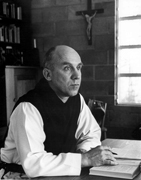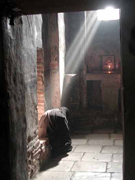Instruction 
Instruction on the Rule by noteworthy modern day monastics or oblates

Solid Buildings and Stodgy Thinking
Solid buildings easily lead to stodgy thinking. How often the Church has failed to respond quickly to conscientious needs because so much financial investment was dependent on the preservation of the status quo — its schools, hospitals, and church buildings? Just as the necessity of long-term planning can lead us to overlook immediate imperatives, so… Read More ›

Caricature of Contemplation
Thomas Merton was adamant that television — at least American television — was a danger for any who are interested in progressing further in the practice of contemplation. He expresses himself on the subject with characteristic verve, a little acerbity, and a not-untypical degree of exaggeration. “The life of a television-watcher is a kind of… Read More ›

The Culture of Death and Entertainment
The culture of death is simultaneously a culture dominated by the notion of “entertainment.” . . . The very notion of entertainment presumes the state of boredom as the norm, which means that a culture increasingly fueled by this notion assumes that our lives are innately and intrinsically meaningless without the constant stream of “stimulation”… Read More ›

Western Nihilistic Culture
The nihilistic culture propagated by so many countries in the West emphasizes neutrality among options. We are free to choose whatever suits us best-something becomes right by the fact of our choosing it. No particular option has any greater right to be chosen than any other. This denial of the objectivity of values leads to… Read More ›

Entertainment becomes necessary when life has lost all meaning
What is the dominant mode of experience at the end of the twentieth century? How do people see things, and how do they expect to see things? The answer is simple. In every field, from business to politics to marketing to education, the dominant mode has become entertainment. . . . In other centuries human… Read More ›

The Meaning of My Life
Only when we see ourselves in our true human context, as members of a race which is intended to be one organism and one body, will we begin to understand the positive importance not only of the successes but of the failures and accidents in our lives. My successes are not my own. The way… Read More ›

On the Observance of Lent: Divine relationship
[Return to part four] As we look at Lent as individuals and as community, it as a time for renewal in lectio. It is a time for opening ourselves in a renewed and special way to letting the Lord open up our lives in relationship with him through lectio. We allow his word be heard… Read More ›

On the Observance of Lent: Purity of heart.
[Return to part two] Lent is a time of coming to purity of heart. It is the pure of heart who see God. It is a challenge. But I think the community should support us in this by certain signs, symbols, and actions. The older monks may remember how dramatic Lent was. We put up… Read More ›

On the Observance of Lent: Observances during Lent
[Return to part one] Benedict speaks of monks undertaking particular observances to mark Lent for themselves. What is the purpose? It is that we have this joy of spiritual longing. That Lent is really a time of freeing ourselves and opening ourselves more and more to the fullness of Easter. We can answer these questions… Read More ›

